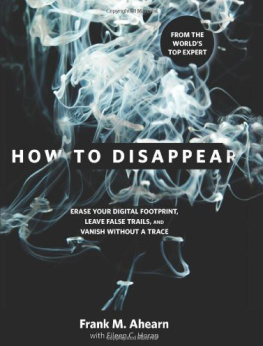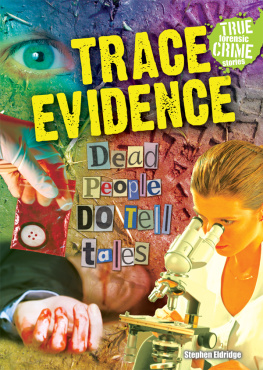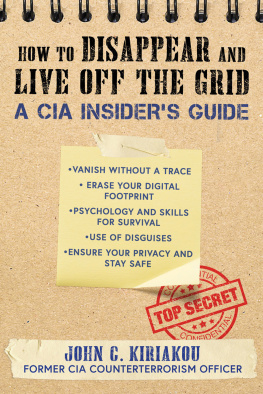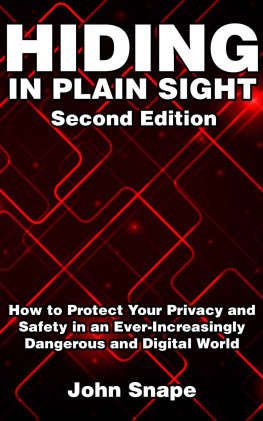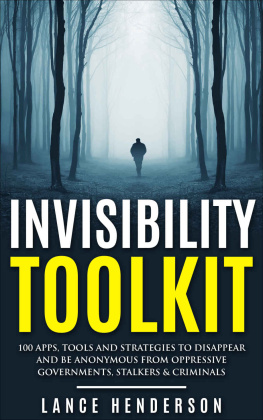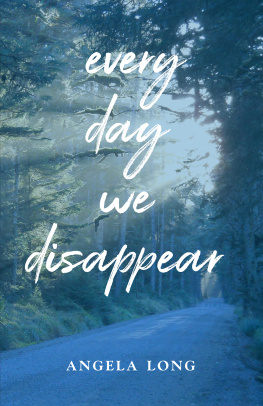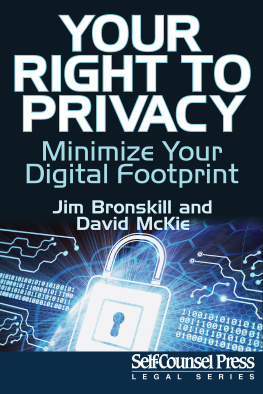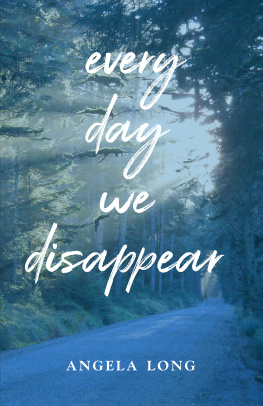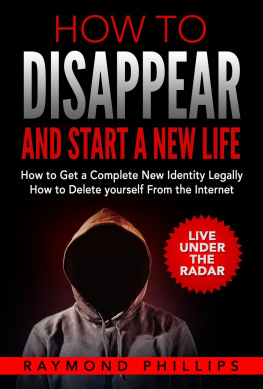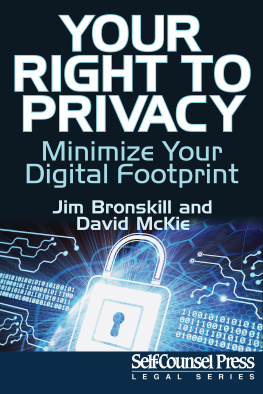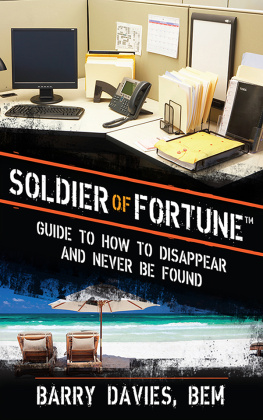HOW TO DISAPPEAR
Erase Your Digital Footprint, Leave Fake Trails, and Vanish without a Trace
Frank M. Ahearn and Eileen C. Horan
Copyright 2010 by Frank M. Ahearn and Eileen C. Horan
ALL RIGHTS RESERVED. No part of this book may be reproduced or transmitted in any form by any means, electronic or mechanical, including Photocopying and recording, or by any information storage and retrieval system, except as may be expressly permitted in writing from the publisher. Requests for permission should be addressed to www.disappear.info or www.eileenhoran.com Attn: Rights and Permissions.
Library of Congress Cataloging-in-Publication Data is available on file.
MY NAME IS FRANK
Youre reading this book for one of two reasons: You want to vanish without a trace, or youre curious about what it would take.
I met a guy like you once. He caught my eye in a bookstore in New Jersey where I like to people-watch from time to time. He was nervous, looking all around, picking up book after book about personal privacy and offshore banking. Then he wandered to the travel section and pulled out a guide to Costa Rica. He never even noticed me, the unassuming guy with a gray ponytail and sunglasses trailing him about a dozen yards behind.
We got in line to check out at the same time. He fidgeted in place, not realizing the same guy was still behind him. He finally got up to the cashier, and I watched with a raised eyebrow as he paid for his books with a credit card.
Big mistake , I thought. I wondered if he was really trying to disappear. I sincerely hoped he wasnt, because if that was the case, he had just left anyone trying to find him a big, fat clue.
After checking out, he made his way upstairs to the caf. I followed him, grabbing a latte as I watched him settle into a corner table and obliviously thumb through his purchases.
What an idiot. Doe snt he know there are cameras everywhere? Doesnt he know how easy it is to trick a security guard into giving Although Ive changed some details about our meeting, of course. you camera footage if you say the right things (and who cares if those things are true as long as they get results)? What if someone who was looking for him decided to do just that? I sort of felt bad for the poor bastard. If he had a good reason for wanting to disappear, or if he was in real trouble, he didnt stand a chance.
Thats when a light bulb went off in my head. I decided that I wasnt going to let this guy screw himself over. I could help him. After tossing my latte into the garbage, I walked right up to his table, said hello, shook his hand, and asked if I could sit down and talk to him for a minute.
Startled, he agreed.
I told him that my name was Frank M. Ahearn and that for many years I had worked as something called a skip tracer. Clients paid me thousands of dollars to find people who were trying to hide: jailbirds, deadbeats, subpoenaed witnesses, the threatened and fearful, and just about anyone else you could think of who was trying to hide for whatever reasons they might have. Some of the people who hired me were tabloid editors trying to get their hands on celebrities. When they wanted to talk to some kids who had spent the night with Michael Jackson at Neverland, they called me. When they wanted to monitor O. J. Simpsons bank accounts, they called me. I once was hired to find Ozzy Osbournes private telephone n umbers for a paparazzo. I found all eight of them. I was hired to find George Harrison as he languished on his death bed. He was in New Jersey. My work fostered countless tabloid covers and brought a whole lot of criminals to justice.
I told the guy that the people I went after usually made my job easy. No matter how hard they tried to hide, they always slipped up, invariably doing something to give themselves away. Some big mistake would lead me to their location inside of an hour or two. Exceptions were rare.
I gestured at the pile of books the guy had spread out on the table and told him that if he was trying to hide, he had already made a fatal mistake. Since hed bought all of these books with his credit card, they could easily be traced. Finding his location would be childs play for any skip tracer worth his salary.
Heres my first piece of advice for all you would -be disappearing artists: Dont buy this book with a credit card. (But please do buy it!)
That white guy turned even whiter. He wasnt jus t idly curious about disappearing. He was serious. Or at least he thought he was.
So I kept talking. I explained how I or another skip tracer would track him down. Id call up his credit card company under a false pretense, claiming to be him, saying that I needed to go over my recent credit card purchases, and giving some made- up reason that would sound compelling. The customer service rep would then read me all the charges the guy had recently made, including the bookstore purchases. Id say thank you, hang up, and call the bookstore and persuade whichever clerk picked up to tell me what I had bought with my credit card. Id provide him with a transaction number or the name and address of a frequent-shopper account.
Once I knew the name of the books he d purchased, I told the guy, I would have a pretty good idea of where he was headed. After that, Id begin calling the airlinesUS Airways, Copa, American, all the companies that served Costa Rica until Id located his flight information. Then Id look at customer records for car rental companies around the airport in San Jos. If hed put down his real name and address, Id be able to find the location of his hotel in minutes. Id call up the repo company or the Mafia or whoever had hired me, tell them where he was, and he could say sayonara to his great new life.
You could see the oh fuck in his eyes. He was dazed Id obviously just shot his grand disappearing plan to hell. But he was grateful. He asked for my phone number and said he wanted to call me to continue the conversation. We shook hands and went our separate ways.
I left the bookstore and drove to my office, where my business partner Eileen Horan was banging away on her computer, trying to find all the people wed been hired to locate that day. I told her what had just happened with the guy in the bookstore. After laughing about his dumb mistake with the credit card, we started to talk about how he really be handling that move to Costa Rica.
That got us thinking. Was this guy doomed no matter what he did? Was it possible to disappear without a trace? Could someone whos disappeared ever really feel confident that no one would find him, not even professionals like us?
We went over everything we would do to throw a smart pursuer off his trail. First, wed delete or destroy all the information that was out there on him, or at least make it damn hard to find. Then wed concoct a bunch of deceptive leads that would send the pursuer on a wildgoose chase. Finally, wed build a new life for him quickly and quietly, using a series of anonymous private mailboxes and prepaid phones. Because Eileen and I used public records, credit reports, utility statements, and people-search Web sites to do most of our skip-tracing work, wed be pretty much out of luck if those records were misleading or unavailable. We figured most other skip tracers would be, too. As we talked, we realized we were onto something. We had valuable advice to give people who wanted to disappear. Plenty of books on the topic were available to the curious, but none of them talked about the flip side of the coin: the people like me and Eileen who would stop at nothing to find someone if the price was right. As long as our skip-tracing techniques and tricks remained a secret, no one had a prayer of outsmarting us.
That was good for our business, but bad for our targets privacy and freedom. We thought law-abiding citizens deserved the chance to cut off contact with their past and begin a newer, more discreet life if thats what they chose to do. And we could help them do it. Why not start a disappearing business?

